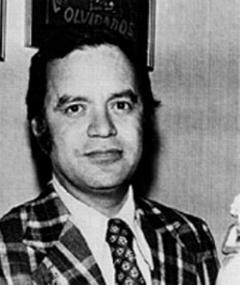El Alimento del miedo (lost Mexican horror film; 1994): Difference between revisions
(Capitalised the film's titles (reverse this if that was incorrect), general grammar edits. Feel free to correct anything that I've either missed or messed up.) |
(Sortkey + other fixes (if capitals are incorrect, revert them, not the whole edit!)) |
||
| Line 1: | Line 1: | ||
{{InfoboxLost | {{InfoboxLost | ||
|title=<center>El | |title=<center>El Alimento del Miedo</center> | ||
|image=JLM.jpg | |image=JLM.jpg | ||
|imagecaption=Juan López Moctezuma, director of the film. | |imagecaption=Juan López Moctezuma, director of the film. | ||
|status=<span style="color:red;">'''Lost'''</span> | |status=<span style="color:red;">'''Lost'''</span> | ||
}} | }} | ||
'''''El Alimento del Miedo''''' (The | '''''El Alimento del Miedo''''' (The Food of Fear, translated from Spanish) was a 1994 Mexican horror film directed by Juan López Moctezuma, who also directed critically panned films such as Matar a un Extraño (1983) The Mansion of Madness (1973) Mary, Mary, Bloody Mary (1975) and Alucarda (1977), with El Alimento del Miedo being his last work before he passed away one year later, in 1995. | ||
The film was written by López Moctezuma himself and Jorge Victoria, and starred López Moctezuma, Isaura Espinoza and Jorge Russek. The film is based on a Mexican legend named “La tamalera asesina”. | The film was written by López Moctezuma himself and Jorge Victoria, and starred López Moctezuma, Isaura Espinoza and Jorge Russek. The film is based on a Mexican legend named “La tamalera asesina”. | ||
| Line 19: | Line 19: | ||
The film has remained mostly obscure since its original screening on various Mexican cinemas, there are no available posters for the film, the film had a poor rating, and the fact that half of the cast (including Juan) passed away, makes the chances of finding a copy much harder. | The film has remained mostly obscure since its original screening on various Mexican cinemas, there are no available posters for the film, the film had a poor rating, and the fact that half of the cast (including Juan) passed away, makes the chances of finding a copy much harder. | ||
The rest of the cast is still active, with Jorge Victoria making an appearance in the pilot of the TV series Queen of the South and Isaura Espinoza also appearing in a post-production series called Desvanecer. However, contacting them is hard since they do not seem to use social media. | The rest of the cast is still active, with Jorge Victoria making an appearance in the pilot of the TV series ''Queen of the South'' and Isaura Espinoza also appearing in a post-production series called ''Desvanecer''. However, contacting them is hard since they do not seem to use social media. | ||
Info available for the film is also poor, with IMDb and the site of the Mexican Secretary of Culture being the only sites with more reliable information on the film. | Info available for the film is also poor, with IMDb and the site of the Mexican Secretary of Culture being the only sites with more reliable information on the film. | ||
== | ==References== | ||
* [http://www.imdb.com/title/tt0896690/ IMDb page on the film.] | * [http://www.imdb.com/title/tt0896690/ IMDb page on the film.] | ||
* [http://www.cinetecanacional.net/php/detallePelicula.php?clv=5415 Mexican Secretary of Culture page of the film.] | * [http://www.cinetecanacional.net/php/detallePelicula.php?clv=5415 Mexican Secretary of Culture page of the film.] | ||
[[Category:Lost films]] | [[Category:Lost films|Alimento del Miedo, El]] | ||
Revision as of 13:41, 28 August 2017
El Alimento del Miedo (The Food of Fear, translated from Spanish) was a 1994 Mexican horror film directed by Juan López Moctezuma, who also directed critically panned films such as Matar a un Extraño (1983) The Mansion of Madness (1973) Mary, Mary, Bloody Mary (1975) and Alucarda (1977), with El Alimento del Miedo being his last work before he passed away one year later, in 1995.
The film was written by López Moctezuma himself and Jorge Victoria, and starred López Moctezuma, Isaura Espinoza and Jorge Russek. The film is based on a Mexican legend named “La tamalera asesina”.
Plot
The film takes place in an underclass neighborhood of Mexico City, when a troupe features a circus act, led by Don Ramón (López Moctezuma himself). He and his wife Petra (Isaura Espinosa) have to take care of the daughter of a neighbor nicknamed "Flea"who has been jailed for drug trafficking.
Petra thinks that Flea must earn a living (despite her being 5 years old), entrusting her several domestic tasks; the little girl later befriends Pepito, who works as a clown on the street.
Complications arise when a person with satanic tendencies arrives at Ramon's house and develops a romantic interest in Petra. A fight between the three adults causes Flea to suffer a fatal accident which. To not get into any problems with authorities, Petra uses Flea's meat to make tamales that she sells on the street.
Status
The film has remained mostly obscure since its original screening on various Mexican cinemas, there are no available posters for the film, the film had a poor rating, and the fact that half of the cast (including Juan) passed away, makes the chances of finding a copy much harder.
The rest of the cast is still active, with Jorge Victoria making an appearance in the pilot of the TV series Queen of the South and Isaura Espinoza also appearing in a post-production series called Desvanecer. However, contacting them is hard since they do not seem to use social media.
Info available for the film is also poor, with IMDb and the site of the Mexican Secretary of Culture being the only sites with more reliable information on the film.
